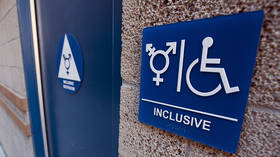‘Completely reversible’? UK transgender charity instructs teachers on puberty blockers to 12yo kids

A transgender advocacy NGO has told teachers that puberty blockers are harmless and should be given to children as young as 12 in a “model” training session for UK schools. Scholars and medics warn such advice is “disturbing.”
Administering puberty blockers to children questioning their gender identity as early as the age of 12 is beneficial for them as such treatment is “completely reversible” and gives them “immense relief,” a trainer with the transgender lobby group Mermaids told a gathering of some 20 teachers and pastoral support workers at the Newman University in Birmingham last December.
The content of the meeting, which has arguably become a blueprint for further training sessions held by the group in schools across the UK, was revealed by the Times on Sunday.
Also on rt.com Be prepared for transgender numbers to skyrocket in future generations, NHS health boss says“Puberty blocker medication doesn’t make any changes,” the trainer argued, explaining that it simply puts “a pause button on the pituitary gland and freezes puberty where it is” and the biological processes “will recommence” as soon as the treatment is stopped.
The Mermaids’ line of argument did not sit well with one of the meeting’s attendees, Michael Conroy, a pastoral support worker, who taped the footage. He told the Times that he was concerned about the group literally encouraging young children to believe that they were “born in the wrong body.”
It’s putting children at risk.
His concerns were shared by Michael Biggs, an associate professor in sociology at St Cross College, Oxford, who told the Times that such a strategy pushes children toward further medical intervention up to sex affirmation surgery.
Teach my child acceptance, BBC – but not the unscientific nonsense that is 100+ genders(Op-Ed by Igor Ogorodnev)https://t.co/07q21FhvBQpic.twitter.com/wm6UR1VIAo
— RT (@RT_com) September 13, 2019
“Mermaids [are] not giving pupils a choice that they may just be gay or lesbian. Instead, it is diverted down a drastic path that ultimately ends in surgery. To be propagating such information to schools is disturbing,” he said.
The group stated on its website that its advice was based on an “international scientific study and 25 years of experience in this field.” It also boasted about receiving funding from the UK Department for Education ever since the December 2018 session, under a program “overseen by the Government Equalities Office.”
While Professor Biggs has been accused of “transphobia” in the past, according to some reports, he is far from being the only one who sounds an alarm over practices that many find quite controversial. Earlier this year, groups of medical specialists both in the UK and across the pond – in the US – warned about the long-term effects of puberty-blockers and hormonal drugs, calling it a “grave public health concern.”
Also on rt.com 17 children from one UK school, majority with autism, in ‘process of changing their gender’The doctors warned that treatment starting with puberty blockers and often ending up with gender-reassignment surgeries has horrifying side effects, including “surgical complications, thromboembolic and cardiovascular disease, osteoporosis, malignancy, and persistently elevated rates of suicide.”
The American College of Pediatricians (ACP) – a conservative children’s advocacy group – also noted that healthcare professionals are “increasingly prohibited from investigating psychosocial factors” forcing children and adolescents to question their gender identity.
Meanwhile, links between gender identity issues and autism have been repeatedly invoked in the past. In 2017, a London clinic for transgender children reported that a third of their patients had “moderate or severe autistic traits.” Yet, instead of paying more attention to the psychological side of the issue, many schools still apparently opt for going ahead with gender affirming actions.
Think your friends would be interested? Share this story!













